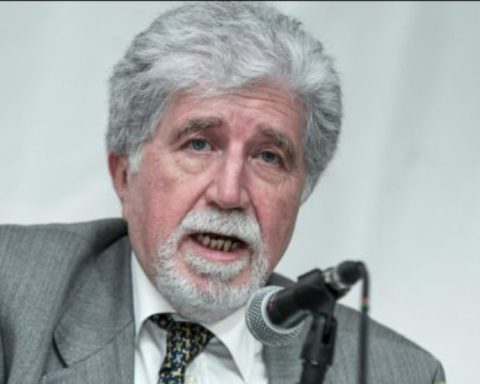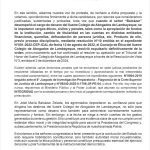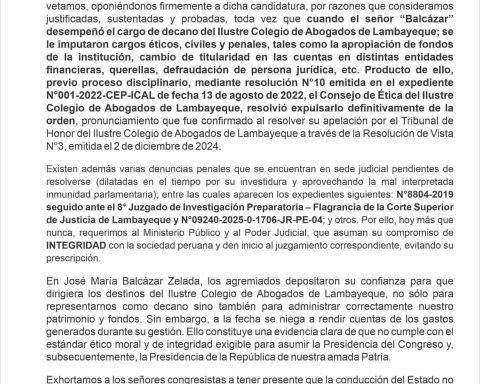A reform that expands rights to generate more equality in a framework of sustainability. A necessary reform. A reform for which the time is now. This is how the Executive Power justified the need for a comprehensive reform of the social security system that it will try to achieve during this period. He did so through an outline with an extensive series of arguments and guidelines that was sent late this Friday to the 73 senators and deputies of the government coalition.
“For many years, politicians and rulers of all parties have agreed on the need for a reform of this type,” says the text, to which he agreed The Observer. Several of the main figures of the current ruling party are cited there, such as the Minister of Economy, Azucena Arbeleche, the head of Labor and Social Security, Pablo Mieres, the director of Planning and Budget, Isaac Alfie, and former president Julio María Sanguinetti.
And he also names figures linked to the Broad Front, like the late President Tabaré Vázquez, Danilo Astori and José Mujica, to which Presidency had appealed last Thursday the 12th when, first of all, the ruling party presented the general guidelines emanating from the commission of experts that has worked since last year on the general guidelines of the proposal.
In the document, the government says it has surveys that indicate that 70% of Uruguayans believe that the current pension system is unfair and that it should be reformed. Although strengths that must be maintained or increased are identified, deficiencies that must be corrected and challenges that must be faced are also highlighted. In particular, the inequality in access to the benefits that can be obtained depending on which box is quoted. Added to this is the phenomenon of a society in which there are more and more elderly while the young population decreases, which makes the “backpack” on the workers increasingly heavy and increasingly compromises the sustainability of the system.
That is one of the main technical supports of the proposal. A report from the Social Security Bank (BPS) presented at the meeting between President Luis Lacalle Pou and legislators stated that a low birth rate and an increasing life expectancy will put the foundations of the system in check. Projections in this sense indicate that, by 2100, the Uruguayan population will be 2.7 million people, a “serious” situation in the eyes of the authorities, since it poses severe challenges for future generations.
The Executive Power made it clear that those who are already retired will not have any change in their situation. If the reform were finalized today, it would not cover those born before 1966 either.
“The moment is now”, expresses the document. In the government’s opinion, today it would be possible to undertake a reform with a very gradual transition period that “expands rights” while “improving the situation” of workers with lower incomes. “The effects of the pension reforms are not immediate, so as time goes by it will be less and less possible to propose such gradual transitions,” he warns. “This is a unique opportunity for change.”
A very gradual reform
The government envisions a transition that goes from 15 to 20 years in all the subsystems, which would progressively converge to a common pension system, with the principle of equality at the base of the proposal. A regime with the same rules for all the boxes where the differences are proportional and have a solid foundation. The proposal involves distinguishing between a “normal” retirement age for which there are two alternatives. The first would include those born after 1967. The other would include those born after 1971.
The “normal” age is the one that is proposed to be increased “very gradually” over a period of not less than 14 years. “The expansion of rights will only be possible if social security is sustainable,” she warns. “For that, the retirement age must increase progressively.”
In the first of the examples and in a current scheme of 60 years of age and 30 of contributions, the proposal is that those born in 1967 have the limit increased by one year: they must wait to retire at 61. Those born in 1968 they should work until they are 62, those born in 1969 will have to work until they are 63, and so on until they reach 1971. The minimum retirement age for those born after that date would be set at 65 years. This new proposed regime could have exceptions, such as for people with a long history of contributions.
An “early age” is also provided, which will make it possible to deal with certain cases, such as people engaged in dangerous work or exposed to especially severe risks.
The proposed reform aims to increase coverage and establishes minimum levels of protection in which “every peso counts.” A supplement is proposed – by General Income – for those pensions that, having contributed long enough, do not reach adequate benefit levels, with a calculation formula that “rewards” the highest contribution made.
It also aspires to establish an additional pension for old age or disability that recognizes the value of the retirement contributions made. There, cases are documented that fail to configure retirement grounds but that have between eight and nine years of contributions, which would lead to an increase in the current benefit. “The most vulnerable are going to charge significantly more than they do today,” he says.
The reform also proposes to universalize the right for all retirees to start or maintain a work activity, as long as it is different from the one they performed as active. Today, as indicated, only former bank employees, policemen, military or public officials have this right. Most retirees in the private sector do not have it.
Another point to include is the extension in the recognition of one year of work for each child to all subsystems, and to double that provision in the case of children with severe disabilities. In addition, it is planned to maintain benefits such as the Special Subsidy for Compensated Inactivity for those who are unemployed and very close to retirement, as well as the possibility of accessing retirement generated by personal savings under conditions similar to the current ones or, if they are not reached the 30 years of work in situations of long-term unemployment not covered by the system, maintain the current minimum age of 60 years.
there must be will
The government claims in the document that it is a reform arising from social dialogue and that it needs agreements. “It’s a state policy,” he says. This is a message that the ruling party has been giving insistently. There must be an agreement of the entire political system. Otherwise, several members of the coalition underlined, the Broad Front will have to take responsibility for the effects of not achieving a reform.
President Lacalle Pou had remarked last week that the pension reform was, in addition to a promise made in the electoral campaign, a personal commitment. “We are all going to have to make an effort,” said the president this Friday at a press conference. “You have to leave a sustainable system,” otherwise “if this path continues, your children and my children will not be able to retire, at least with a retirement as they deserve,” he added.
Along these lines, the government document speaks of the willingness to establish “new channels of dialogue” for which, it clarifies, actors with a “real and sincere will to agree” are required.

















